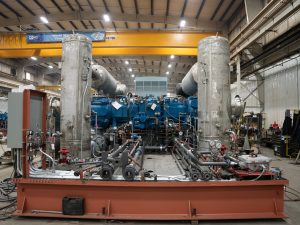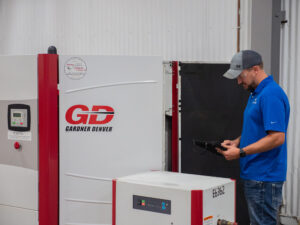Every winter, we get to that one point of the cold season where you just hit your limit. The snow, ice and blistering wind that seems to cut through your clothes and body leaves you wondering, “Why can’t I stay warm?” The cold weather takes its toll on all of us, and the same is true about your compressor and pumps. Preparing compressors and pumps for cold weather is not something that is very difficult; however, preparing compressors and pumps for cold weather is a necessary step to ensuring your equipment is functioning properly during a season that, just like with us, causes things to slow down a bit. If you are worried about preparing compressors and pumps for cold weather, here are some ways you can ensure your equipment doesn’t freeze up during the winter.
COLD WEATHER COMPRESSOR TIPS
Air compressor systems are typically located outside facilities or, if they are inside, insulation is only done at a minimal level to keep things somewhat comfortable. While the other seasons help maintain ideal operating temperatures for the compressors, the winter months can drop temperatures to 40 degrees Fahrenheit or below for an extended period of time, causing many compressors to break down or fail. From frozen fluids that block up or crack the compressor to sludge-like fluids that may increase your energy costs, there are many ways cold weather can damage your compressor. Here are some tips of what you can do to help get through the winter months.
Winterization
We winterize our homes, our lawn mowers and other machines, so why wouldn’t you take the same steps with your compressor? The process of inspecting the compressor, any enclosures or the drains and pipes should be started in September. You may have to repair the weatherstripping or insulation, but that is a small price to pay in the long run. When it comes to the drains and pipes, you’ll need to keep these components as clear as possible during the winter. Be sure that any repairs to warping or cracking are done before the cold makes it even worse.
Maintenance
Throughout the year, you inspect and do required maintenance. This should continue in the winter months as well, and it is not time consuming or difficult. Simply performing a weekly checklist will ensure your compressor is safe from the cold. Check the compressor for moisture and ice buildup daily before you power up the system, drain the condensate manually once a day, check the drain for any obstructions on a regular basis, check your fluid levels and top off any oil at the end of each day.
COLD WEATHER PUMP TIPS
No matter if you’re an expert or just starting your career, when the temperature drops below 32° Fahrenheit serious damage can start to happen to your pump. Pressures of expanding ice can cause more than just a headache. It can cause problems that put a crack in your pumps and your business. Even though pumps are usually made of durable materials like cast iron or aluminum, pump manufacturers haven’t figured out how to prevent them from being damaged by ice. And while a cracked pump is the worst-case scenario, protecting against it is not insurmountable.
Drain Pumps
If you can shut down your pumps during the winter, the simplest way to protect your pumps in the cold is to drain your pump right before the temperatures start to fall. Doing so will ensure that all water is completely drained. This will make sure any freezing or thawing related to the cold weather will not cost you any repairs or, even worse, replacement.
Heat Can Help
You might be afforded the option of shutting down during the winter. If you must continue to find a way to operate your pump in the cold, a heating kit could be a solution. Most kits produced today have a switch that flips on automatically when temperatures drop below a certain threshold. This heater will provide just enough warmth to keep your pump operational. They are not hard to set up and don’t require constant monitoring thanks to their advanced technology, which allows you to manage the system from your smartphone or computer.
Oil Up
Sticking to the basics is still the best way to make sure your pump is safe and functioning properly, even during the cold weather. That’s why checking your oil is imperative. Pumps work best when they are smoothly moving, which requires oil. Moisture and condensation in the bearings can turn to ice during the winter months and halt your pump’s movement. You may even need to switch to a synthetic oil during the winter months as an alternative too.
The cold weather is something most of us can tolerate, but we all reach our breaking point. Preparing your compressors and pumps for cold weather is something that will help your equipment bide its time for the warmer weather. If you still have questions and are unsure what steps help prepare your compressors and pumps for cold weather, contact us. With more than 75 years of experience as experts with compressors and pumps, we can help you get the most out of the equipment you have.




